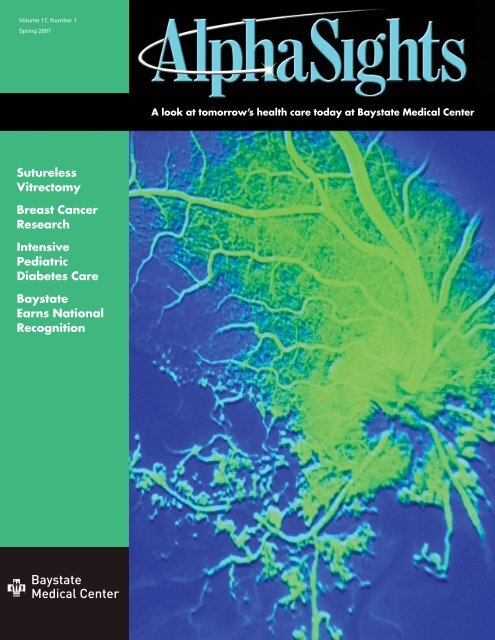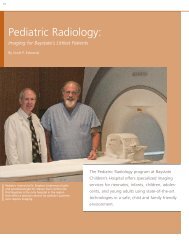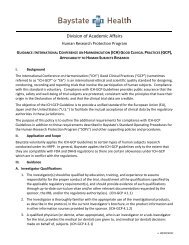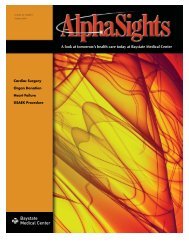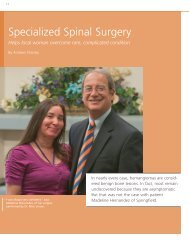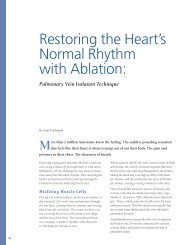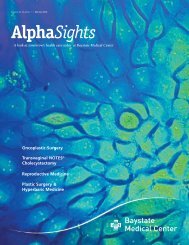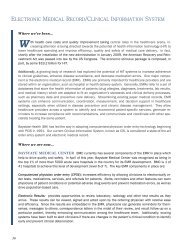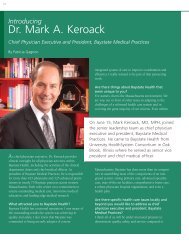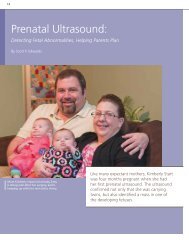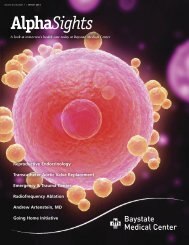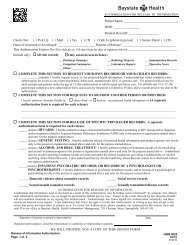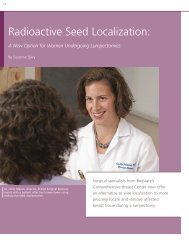Spring 2007, Volume 17, Number 1 - Baystate Health
Spring 2007, Volume 17, Number 1 - Baystate Health
Spring 2007, Volume 17, Number 1 - Baystate Health
You also want an ePaper? Increase the reach of your titles
YUMPU automatically turns print PDFs into web optimized ePapers that Google loves.
<strong>Volume</strong> <strong>17</strong>, <strong>Number</strong> 1<strong>Spring</strong> <strong>2007</strong>A look at tomorrow’s health care today at <strong>Baystate</strong> Medical CenterSuturelessVitrectomyBreast CancerResearchIntensivePediatricDiabetes Care<strong>Baystate</strong>Earns NationalRecognition
Nurturing the SeedsOF EXCELLENCE<strong>Spring</strong>field, Massachusetts<strong>Volume</strong> <strong>17</strong>, <strong>Number</strong> 1Editors: Suzanne B. Hendery,Trish PerraultManaging Editor: Suzanne M. SpiryWriters: Scott P. Edwards,Elizabeth Lafond, Suzanne SpiryDesign: Anna EnglishPhotography: Kent Spiry,Todd Lajoie, Chris SzarekPrinting: Andrews CTPublished by Marketing andCommunications, <strong>Baystate</strong> <strong>Health</strong>,<strong>Spring</strong>field, Massachusetts. Editorialoffices are at 280 Chestnut Street,<strong>Spring</strong>field, MA 01199.Telephone: (413) 794-5050.Submit articlesuggestions and addressall communications to the Editors.This publication was developedfor the medical staff and friendsof <strong>Baystate</strong> <strong>Health</strong>.<strong>Spring</strong> is a time of new life and newbeginnings. Gardeners plant theirseeds and know that with care and commitment,they will grow and blossom. Thesame principles apply in health care. The“seeds” of new ideas, programs, andtechnology that we have planted in thepast are now beginning to bloom, as willthe new seeds we are planting today.Throughout <strong>Baystate</strong> <strong>Health</strong>, our employeeshave accepted the challenge to cultivate thebest: the best in patient care and safety, thebest in employee and patient satisfaction,the best in research and technology.The fruits of our labor are readily apparent,as you can see in this issue of AlphaSights.Our researchers are actively involved in avariety of areas, including breast cancerdiagnosis and treatment and diabetes care,which are improving the lives of people inour communities, and indeed the world.Our expert surgical teams now provide theoption of minimally invasive surgical techniquesfor an ever-growing number of procedures,such as eye surgery, heart surgery,and bariatric surgery, allowing our patientsto heal faster and more comfortably.And <strong>Baystate</strong> continues to garner regionaland national acclaim for patient care andsafety. As you will read, <strong>Baystate</strong> MedicalCenter received the Beacon Award for CriticalCare Excellence for the third consecutiveyear, and was named one of the nation’s100 Top Cardiovascular Hospitals for2006. In addition, <strong>Baystate</strong> <strong>Health</strong> isranked for the eighth consecutive yearamong the “Top 100 Most HighlyIntegrated <strong>Health</strong>care Networks.”While gratifying, we see these honors notas the final product, but as the inspirationto dig deeper and achieve new growth, tocontinue to nurture those initiatives that arestill developing, and to never lose sight ofour mission to improve the health of thepeople in our communities every day, withquality and compassion.Sincerely,Mark R. ToloskyPresident & Chief Executive Officer<strong>Baystate</strong> <strong>Health</strong>
A look at tomorrow’s health care today at <strong>Baystate</strong> Medical Center26121823insideback coverSutureless Vitrectomy Procedure Helps Patients See the LightEye surgeons at <strong>Baystate</strong> Medical Center are performing a new, suturelessform of the vitrectomy procedure, offering patients a less-invasive meansof aiding their vision and quickening their recovery time.Breast Cancer Research Results inGroundbreaking Treatment and PreventionThe <strong>Baystate</strong> Regional Cancer Program is participating in significantbreast cancer research studies that will lead to better breast cancer carefor patients in Western Massachusetts and far beyond.Intensive Diabetes Care for Children Uses Team ApproachThe Pediatric Diabetes Program at <strong>Baystate</strong> Children’s Hospital isplaying a vital role in caring for children in the region with diabetes,and providing families with comprehensive tools to manage the disease.<strong>Baystate</strong> Medical Center Earns National Recognition<strong>Baystate</strong> Medical Center has been recognized nationally for outstandingquality, safety, and patient care, including being named a LeapfrogTop 50 Hospital, a Top 100 Cardiovascular Hospital, and receivingthe Beacon Award for Critical Care Excellence.Honors & AnnouncementsMedical & Nursing PositionsTABLEofCONTENTSCover Photo: Retinal hemorrhageFor more information on any topics featured in AlphaSights, please callThe Professionals at <strong>Baystate</strong> Medical Center at 413-794-2255. Outside thearea, call 1-800-377-HEALTH or visit us online at: baystatehealth.com.
2Eye surgeons at <strong>Baystate</strong> Medical Center areusing instrumentation that is small enough to performvitrectomy procedures with entry sites that areself-sealing and require no sutures.▲Six months ago,Bradley Foster, MD, (left)and his colleague,David Agahigian, MD, (right)began using smaller, 25-gaugeinstruments to performsutureless vitrectomy proceduresat <strong>Baystate</strong> Medical Center.
SUTURELESSVITRECTOMYPROCEDUREHelps Patients See the Light3By Scott P. EdwardsFor many people with diabetes, thethought of vision loss, among themany potentially devastating complicationsof the disease, is terrifying. But unfortunately,diabetic retinopathy is still one of the leadingcauses of severe vision loss in the United States.With strict control of serum glucose levels,and appropriate screening for the early signsof diabetic retinopathy with periodic eyeexaminations, many patients with diabetescan lower their risk of serious visual loss. Insome cases, however, longstanding diabetescan still result in vision-threatening retinopathy.Laser photocoagulation and vitrectomysurgery are two surgical treatments that canslow visual deterioration or even improvevisual function.Now, eye surgeons at <strong>Baystate</strong> Medical Centerare performing a new, sutureless form of thevitrectomy procedure using instruments assmall as the tip of a pencil, and offeringpatients a less-invasive means of aiding theirvision and quickening their recovery time.Threatening the RetinaAlthough patients with diabetes can alsosuffer from other eye conditions such ascataracts or glaucoma, it is the damageto the retina that poses the largest threat.After years of diabetes, damage to the retinalblood vessels can result in edema, ischemia,and hemorrhage. Edema of the centralretina — the macula — can lead tomoderate, gradual vision loss.Laser photocoagulation can help to decreasethe leakage from damaged blood vessels andimprove the edema. In other cases, retinalischemia triggers abnormal blood vesselsto form on the retinal surface. These newvessels, called neovascularization, can ruptureand lead to sudden and severe vision loss.While laser photocoagulation again can beeffective in the treatment of these neovascularvessels, called proliferative retinopathy,once a significant hemorrhage occurs, lasertreatments alone may not be possible.
4Patricia McKenna, RN, service lead forPlastics and Ophthalmology at <strong>Baystate</strong>, says thatthe advantages of the 25-gauge procedure include“less pain, fewer complications, and decreasedsurgery time.” (Surgical team left to right: JohnFrates, CST; Deb Fredenburgh, RN; Louise Leventis,RN; Patty McKenna, RN, CNOR; Israel Guzman, ST.)▲According to Bradley Foster, MD, aneye surgeon with New England RetinaConsultants in West <strong>Spring</strong>field whois on staff at <strong>Baystate</strong> Medical Center,“Laser treatments are performed in anoffice setting whereby the laser light isdirected through a dilated pupil at theretinal surface. However, when a vitreoushemorrhage, or severe bleedwithin the eye, is present, laser light isblocked from reaching the desired tissue.”He continues, “It’s a catch-22. Theyneed laser treatment to stop the bleeding,but the laser will not penetrate allthe blood. The vitreous hemorrhagetherefore needs to be evacuated beforeadequate laser treatment can be applied.”In the early 1980s, vitrectomy surgerywas pioneered. During this procedure,the jelly-like vitreous fluid that fillsthe eye can be safely removed. It hasproved to be invaluable in the treatmentof many retinal disorders,including diabetic retinopathy andretinal detachments, as well as lesscommon problems, such as macularholes, epiretinal membranes, or certaincomplications after cataract surgery.Conventional vitrectomy surgery, anoutpatient procedure, is performedthrough three 20-gauge openings. Afiber optic light is used for illuminationand an infusion cannula helps maintainthe intraocular pressure and replacesfluid that is removed. The vitrector itselfis a device that allows for simultaneousaspiration and cutting of the vitreousgel. In a case of a vitreous hemorrhage,the blood, which collects within thevitreous cavity, is also evacuated.<strong>Baystate</strong> MedicalCenter is the onlysite in WesternMassachusetts offering25-gaugevitrectomy.For many years, says Dr. Foster,performing vitrectomy with 20-gaugeinstruments was the standard of care.“It works well,” he says, “but thethree surgical openings must each besutured closed. Surgical time is longer,post-operative discomfort is greater,and healing is slower than with somenewer techniques.”25-Gauge VitrectomySix months ago, Dr. Foster and hiscolleague, David Agahigian, MD,began using smaller, 25-gaugeinstruments to perform vitrectomyprocedures. “Twenty-five gaugevitrectomy is a recent advancement,”says Dr. Foster. “The instrumentationis small enough that the entry sitesare self-sealing and no sutures arerequired. We can perform these proceduresfaster, and patients experienceless post-operative discomfort withquicker visual rehabilitation.”“The advantages of the 25-gaugeprocedure,” says Patricia McKenna,RN, service lead for Plastics andOphthalmology at <strong>Baystate</strong>, “is thatit is minimally invasive surgery andno sutures are required to close the
5sclera or conjunctiva at the end ofthe case. This results in less pain,fewer complications, and decreasedsurgery time.”Dr. Foster says that while vitrectomywith 25-gauge instruments is becomingmore common, not all patients arecandidates. The instruments are fairlyflexible, and for patients that will requiremore extensive manipulation, 20-gaugeinstruments may still be superior.Currently, <strong>Baystate</strong> Medical Center isthe only site in Western Massachusettsoffering 25-gauge vitrectomy, whereDrs. Foster and Agahigian have performedmore than 100 cases in the lastsix months. “We are pleased to offerthis procedure to appropriate candidateswith severe retinal conditionsin our area,” says Dr. Foster.For more information or torefer a patient, call New EnglandRetina Consultants, PC, at413-732-2333. For a completelist of surgical proceduresperformed at <strong>Baystate</strong> usingminimally invasive or roboticassistedtechniques, visitwww.baystatehealth.com/mis.Becket Man AppreciatesEase of ProcedureFor 55-year-old John Vachula, nearly three decades ofdiabetes has taken a toll on his eyes. He has suffered fromdiabetic retinopathy and has required numerous lasertreatments. But for Mr. Vachula, who lives in Becket, hisretinopathy was quite aggressive, and unfortunately hedeveloped a large vitreous hemorrhage.“Mr. Vachula has had multiple laser treatments,” says hisretinal surgeon, Bradley S. Foster, MD, “which were effectivefor controlling his proliferative diabetic retinopathy forseveral years. Ultimately, however, he suffered a vitreoushemorrhage with severe visual loss.”About a year ago, Mr. Vachula became one of the first ofDr. Foster’s patients to undergo the new sutureless vitrectomyprocedure. “I went in early in the morning for the procedure,”says Mr. Vachula. “I was on my way home by 10:30 that samemorning. I had no pain at all, and about two weeks after thesurgery, I had my vision back.”While he also suffers from other eye problems, such as cataractsand glaucoma, Mr. Vachula says he has had no further bleedingin the eye on which Dr. Foster operated, and his vision hasbeen maintained. Dr. Foster has been monitoring his othereye, which has had several smaller bleeds, but if it were toprogress, Mr. Vachula says he “would love to have the sameprocedure for my other eye.”
6The <strong>Baystate</strong> Regional Cancer Program is participatingin significant breast cancer research studies on the localand national level that will lead to betterbreast cancer care for patients.▲Grace Makari-Judson, MD,medical director of <strong>Baystate</strong>’sComprehensive Breast Center,notes that of the five or six toprecent advances in breast cancerresearch, researchers at <strong>Baystate</strong>have participated in four.
7BREAST CANCERRESEARCHResults in Groundbreaking Treatment and PreventionBy Deb WhittemoreRegional CancerThe<strong>Baystate</strong>Program is participatingin significant breast cancer research studieson the local, national, and even global levelthat will lead to better breast cancer carefor patients in Western Massachusetts andfar beyond.Approximately three million Americanwomen are living with breast cancer, whichis the second leading cause of cancer deathfor women in the United States. While mortalityrates are declining and breast cancerresearch continues to produce promisingresults, many questions remain about thecauses, treatment, and prevention of breastcancer — and how the answers may differfrom woman to woman.“Although we have a long history of participationin clinical research studies, the pastfew years have been particularly exciting,”says Grace Makari-Judson, MD, medicaldirector of <strong>Baystate</strong>’s Comprehensive BreastCenter. “Of the five or six top recentadvances in breast cancer research, weat <strong>Baystate</strong> have participated in four.And while there is a lot to be optimisticabout on the national side, I am very proudof what we have been able to accomplishhere at <strong>Baystate</strong>.”Grants funded through monies raised by theannual Rays of Hope: A Walk Toward theCure of Breast Cancer support <strong>Baystate</strong>sponsoredstudies, while <strong>Baystate</strong> alsoparticipates in clinical trials offered by largecooperative groups including the NationalSurgical Adjunctive Breast and Bowel Project(NSABP) and the Eastern CooperativeOncology Group (ECOG).Cooperative Group TrialsOne of the most significant recent nationalstudies in which <strong>Baystate</strong> was involved, notesDr. Makari-Judson, was launched by theNSABP and explored the use of trastuzumab(Herceptin®), an antibody given in additionto chemotherapy to patients with earlystage breast cancer that overexpresses theHER-2/neu protein.“This study produced some of the mostdramatic results we have had in breast cancertreatment in years,” says Dr. Makari-Judson.Patients with this aggressive subtype of breastcancer who took trastuzumab had a 55percent reduction in recurrence and a 33percent reduction in risk of death as comparedto those patients who had chemotherapyalone, Dr. Makari-Judson notes.
8Another NSABP study, the STAR trial,evaluating options for breast cancerprevention, compared the effects of takingthe drugs tamoxifen or raloxifene.Twenty two thousand women at higherrisk for breast cancer worldwide wereenrolled, including 43 participants from<strong>Baystate</strong>’s Comprehensive Breast Center.This five-year, double-blind studyfound that raloxifene was just as effectiveas tamoxifen at reducing the risk ofinvasive breast cancer, yet with feweradverse effects. Patients who tookraloxifene had a lower risk of developinguterine cancer, blood clots, orcataracts compared to tamoxifen.<strong>Baystate</strong> also participated in anECOG-sponsored study of women withmetastatic breast cancer who took thedrug bevacizumab (Avastin®), a monoclonalantibody that attacks the bloodvessel supply of the cancer. Combiningbevacizumab with chemotherapy significantlyincreased the cancer’s responserate (the likeliness of tumor shrinkage),and doubled the amount of time beforethe cancer progressed or grew again,compared to using chemotherapy alone.Clinical trialshelp define thenew standards of care.“These therapies are now consideredroutine practice,” says Dr. Makari-Judson. “Clinical trials give patientsan opportunity to receive medications aphysician could not otherwise prescribe,in a controlled, regimented environment,sometimes years before the medicationis readily available. More importantly,clinical trials help define the new standardsof care.”Another standout study in which<strong>Baystate</strong> participated was the Women’sIntervention Nutrition study fundedby the National Cancer Institute thatexplored the relationship betweendietary fat reduction and risk of breastcancer recurrence. The study found thatthe benefit of reducing dietary fat was,particularly for women with estrogenreceptive negative cancers, similar inmagnitude to the benefit of othertreatments, including chemotherapy.Home-Grown StudiesWhen the Rays of Hope: A WalkToward the Cure of Breast Cancer, thelargest single day fundraising event inWestern Massachusetts, was foundedin 1994, one of its primary missionswas to encourage breast cancerresearch. Funds from the walk begansupporting breast cancer research at<strong>Baystate</strong> in 1998. Since then, 36 projectshave received funding for research inareas ranging from the molecular levelto the clinical. (See page 10.)Dr. Makari-Judson is currently leadinga study on weight gain following breastcancer treatment, which may be associatedwith a poorer prognosis. Afteridentifying three variables — youngerage, receiving chemotherapy, andhaving a body mass index that is closeto normal — the study will look at 100women over two years to monitor hownutrition and exercise, as well as variablesin body metabolism, may factor withchanges in BMI and body composition.“We are trying to capture importantelements affecting weight gain afterbreast cancer diagnosis. There maybe more to the picture than diet, and
▲9<strong>Baystate</strong> participated in the Women’s Intervention Nutritionstudy funded by the National Cancer Institute, which exploredthe relationship between dietary fat reduction and riskof breast cancer recurrence.as a physician, I want to know whatI should be telling my patients,” saysDr. Makari-Judson. “Patients oftenask, ‘What can I do?’ I want to be ableto best advise them on diet, exercise,and general lifestyle factors.”Studies initially funded through Rays ofHope that show promising preliminaryresults often are a springboard to largerstudies and more grant funding. Anexciting recent example, says Dr.Makari-Judson, is a collaborativestudy between <strong>Baystate</strong> and the PioneerValley Life Sciences Institute on therelationship between women whobecome pregnant for the first time atan early age and the expression of certaingenes, particularly p53, a tumorsuppressor. Originally launched thanksto a $10,000 Rays of Hope grant, theproject recently received a $400,000grant from the Avon Foundation(see page 11).Prior success in obtaining outside fundingfor investigator initiated researchhas been demonstrated by RichardArenas, MD, chief of Surgical Oncologyat <strong>Baystate</strong>, who received a Susan G.Komen grant in 2004 and is studyingCOX-2 inhibition and breast cancerprevention. The impact of this researchcould lead to new preventive strategiesfor estrogen receptor negative breastcancers, a type of cancer not necessarilyaddressed by current prevention drugslike tamoxifen.“I have such a sense of pride in the<strong>Baystate</strong> Regional Cancer Program,when I sit in the audience of largeannual meetings and hear the resultsof national landmark studies as wellas novel approaches conceived anddeveloped locally, knowing we havecontributed our time and resources,staff, and expertise to this greater goal,”says Dr. Makari-Judson.She continues, “Only five percent ofwomen being treated for breast cancerparticipate in a clinical trial. Yet if itwere not for the courage of womenparticipating in trials and the dedicationof the investigators, we would still beperforming radical mastectomies andpracticing ‘one size fits all’ medicine.Advances in research from the laboratoryto clinical practice have helped us totailor our treatments for each womanindividually. We have gained andcontinue to gain a better understandingof breast cancer altogether.”For more information or torefer a patient to the <strong>Baystate</strong>Regional Cancer Program,call 413-794-9338.
10▲When the Rays of Hope: A Walk Toward the Cure of Breast Cancer wasfounded in 1994, one of its primary missions was to encourage breastcancer research. Since then, 36 projects have received funding forresearch in areas ranging from the molecular level to the clinical.Current Studies Funded by Rays of Hope• Lymphedema and exercise• Evaluation of response to chemotherapyfor locally advanced breast cancer• Clinicopathologic correlation of HER-2/neu& activated AKT in metastatic breast cancer• Acupuncture for control of treatmentinduced menopausal symptoms in patientswith breast cancer• Angiogenic activity of c-Abl TK in breastcancer progression• Expression of 14-3-3 sigma protein andBRCA-1 mutation in human buccal cells• Expression of YKL-40 in breast cancer vs.without nodal metastasis and its reactionto clinical outcome• Expression of notch and notch ligands inbreast tumorigenesis• Evaluation of the expression of mTOR inbenign, proliferative, and malignant lesionsof the breast• pAKT’s value as an independent predictorof sentinel lymph node metastasis• Sensitizing breast tumors to therapeuticsthrough modulation of AKT activity• Methylation of 14-3-3 sigma DNA andBRCA1 mutation in human buccal cells• Role of S phase kinase-associated protein2 (SKP2) in breast cancer• Utility of DMBT1 expression in assessingbreast cancer risk in patients w/initialdiagnosis of atypical lesions• HIV related breast disease• sFRP: A novel secreted factor as a putativeenhancer for treatment and prevention ofbreast cancer• The role of Acheron in human metastaticbreast cancer• Relationship of serum insulin levels toweight gain in breast cancer survivorsFor information about any breastcancer research studies offered throughthe <strong>Baystate</strong> Regional Cancer Programand Comprehensive Breast Center, call413-794-9338.
11▲Exploring the Linkbetween Pregnancy, Breast Cancer&Gene ExpressionWomen who have their first full-term pregnancy beforeage 21 have a nearly 50 percent reduction in their risk ofdeveloping breast cancer. Those who have a child afterage 35 have an increased risk, and women who havenever been pregnant have an even greater risk. SallieSmith-Schneider, PhD, a scientist with the Pioneer ValleyLife Sciences Institute (PVLSI), wants to know why.Since its launch in 2002, breast cancer research hasalways been a primary focus for the Pioneer Valley LifeSciences Institute (PVLSI), a research foundation andpartnership between <strong>Baystate</strong> Medical Center and theUniversity of Massachusetts-Amherst (UMass). For severalyears, a Breast Cancer Working Group that blends theknowledge and expertise of UMass scientists and <strong>Baystate</strong>clinicians has met monthly to discuss and brainstormspecific breast cancer research projects.The idea for the study originated within this group andled to an initial $10,000 grant from Rays of Hope. Somepromising early data paved the way for a recent $400,000grant from the Avon Foundation to study how age of firstfull-term pregnancy alters the risk of breast cancer.“Evidence indicates that one of the most striking changesthat occurs in response to pregnancy is the release of p53,a tumor suppressor gene,” says Dr. Smith-Schneider, whois leading the study with D. Joseph Jerry, PhD, a UMassprofessor and head of the Breast Cancer Working Group.When pregnancy does not occur until a woman is in hermid-thirties or not at all, the p53 gene continues mutationsthat can lead to breast cancer development.Collaborating with Kristin Stueber, MD, chief of PlasticSurgery at <strong>Baystate</strong> Medical Center and medical directorof <strong>Baystate</strong> Plastic Surgery Associates, the research teamwill study the tissue of over 100 woman who have hadbreast reduction surgery to compare healthy breast tissueto the tissue of breast cancer patients and track how p53and other genes react different depending on a woman’sage of first pregnancy or if she has never been pregnant.“We have the opportunity to look at a number of genessimultaneously and explore the differences in expression,”says Dr. Smith-Schneider. “I am enthusiastic about thepartnership between <strong>Baystate</strong> and UMass, and that we arebeginning to delve into the field of prevention rather thanjust treatment of breast cancer. The thought that we mightbe able to prevent breast cancer in the future is exciting.”Avon Foundation Grant InvestigatorsD. Joseph Jerry, PhD, UMass (Primary Investigator)Sallie Smith-Schneider, PhD, PVLSIMelissa Troester, PhD, UMass School of Public <strong>Health</strong>Carol Bigelow, PhD, UMass School of Public <strong>Health</strong>Grace Makari-Judson, MD, <strong>Baystate</strong>’s ComprehensiveBreast CenterKristin Stueber, MD, <strong>Baystate</strong> Plastic SurgeryRichard Arenas, MD, <strong>Baystate</strong> Regional Cancer Program,Surgical OncologyGiovanna Crisi, MD, PhD, <strong>Baystate</strong> Pathology AssociatesChristopher Otis, MD, <strong>Baystate</strong> Pathology Associates
12<strong>Baystate</strong>’s Pediatric Diabetes Program is the onlyone of its kind in Western Massachusetts, offering children withdiabetes and their families valuable tools to manage their care.▲“In order to avoid the long-term complicationsof diabetes, it is imperativethat we achieve as good diabetescare as we can for our children andfamilies,” says Holley Allen, MD,chief of Pediatric Endocrinology at<strong>Baystate</strong> Children’s Hospital.
13INTENSIVE DIABETESCARE FOR CHILDRENUses Team ApproachBy Deb WhittemoreThe only program of its kind in WesternMassachusetts, the Pediatric DiabetesProgram at <strong>Baystate</strong> Children’s Hospital is playinga vital role in caring for children in the region withdiabetes, and providing them and their familieswith tools to manage the disease on their own.Over 20 million children and adults in the UnitedStates have diabetes. Type 1 diabetes, in which thebody’s immune system destroys the cells that makeinsulin, is one of the most common chronic illnessesin children. Type 2 diabetes occurs when the bodydoes not respond properly to insulin and is associatedwith physical inactivity and obesity. Untilrecently Type 2 diabetes was seen primarily inadults, but has become more prevalent in childrenand adolescents as obesity in young peoplecontinues to be a major health issue.Without proper and consistent treatment andmanagement of the disease, diabetes can leadto a multitude of serious health complications,including heart and blood vessel disease, blindness,kidney failure, and foot ulcers.“In order to avoid the long-term complications ofdiabetes, it is imperative that we achieve as gooddiabetes care as we can for our children and families,”says Holley Allen, MD, chief of PediatricEndocrinology at <strong>Baystate</strong> Children’s Hospital.Intensive Care“Successful intensive therapy requires a team,”says Dr. Allen. “Care for diabetes has becomemore sophisticated and complicated. There’s beenan incredible explosion in the number of therapiesand devices available; complex dietary considerations;ways to achieve tight glucose control. For ourprogram, the mean HbA1c last year was 7.8 percentoverall — better than most other published andnon-published results. We are proud to offer ourpatients with diabetes and their families a high levelof expertise through the only comprehensive pediatricdiabetes program in Western Massachusetts.”The Pediatric Diabetes Program team includesthree pediatric endocrinologists, as well as a nursepractitioner, registered nurses, a dietitian, and asocial worker. Care begins immediately after thechild is diagnosed. Patients are often referred bytheir primary care physician, who is also considereda part of the care team, and are seen almostimmediately at the program’s 3300 Main Streetoffices in <strong>Spring</strong>field. The program’s goal is toprovide care for the child on an outpatient basisif possible.
14“We have found that families learnbetter and take on the responsibilityfor diabetes management much morequickly if they are empowered rightaway, demonstrating what they needto do to manage diabetes on an outpatientbasis,” says Dr. Allen.Children and families first meet with apediatric endocrinologist to review thediagnosis and discuss next steps. Familiesthen meet with a nurse educatorwho walks them through the specificsof caring for diabetes, including checkingblood sugar, administering insulin,and handling illnesses and emergencies.They also meet with a dietitian toreview the child’s current diet anddiscuss dietary changes needed to helpthe patient best maintain proper bloodsugar levels.“Parents learn that their child has diabetesand are not only concerned aboutinsulin injections and blood sugar testing,but worry their children will haveto completely change how they eat,”says Lynn Henry, RD, CDE, a registereddietitian and certified diabeteseducator. “I offer reassurance by tellingthem there isn’t anything their child willnot be able to eat; it’s more a matter oftiming of meals and portioning of specificfoods. At that point they usually relax.We work together to establish a mealplan that provides many resources tohelp them with dietary changes.”Care for diabeteshas become moresophisticatedand complicated.The program’s social worker also meetswith each family initially and is availableas an ongoing resource to assistwith psychosocial issues that may ariseafter the diagnosis. In addition, the child’steachers and school are considered partof the team. Program staff stay in touchwith school nurses regularly, providinginsight and advice about caring for achild with diabetes in the school setting.A member from the school nursesof <strong>Spring</strong>field sits on the program’sadvisory board.The team also works closely with<strong>Baystate</strong>’s Pediatric Weight ManagementClinic. Children with Type 2diabetes, which is linked to obesity, areoften referred to the program. In somecases, dietary changes, increased exercise,and weight loss may help delayor even avoid the occurrence of Type2 diabetes. The Weight ManagementProgram offers an interdisciplinaryapproach to weight loss in a groupsetting for children and parents.After the initial consultation, patientsreturn frequently for check-ups forseveral months, until their condition isstabilized, and then for regular checkupsevery three months. Between visits,families can call and speak with aprogram nurse during weekdays aboutdiabetes questions or concerns; a staffmember from the Pediatric DiabetesProgram is on-call 24 hours a day,365 days a year.
15▲“Successful intensive therapy requires a team,” says Dr. Allen. (Front row, left to right:Sandra Mathis, CMA; Jean Yarrows; Dennis Brenner, MD; Marta Monsalve, RN;Loretta Nowak, RN; Lynn Henry, RD, CDE; Kathleen Dunn, RN; Cynthia Johnson, NP;Back row, left to right: Marybeth Roy, RN; Edward Reiter, MD; Holley Allen, MD.)Insulin Pump ProgramAfter their initial training and education,families may wish to participate in theInsulin Pump Program, the only one ofits kind for pediatric patients in the region.Insulin pumps, which have become anincreasingly popular way to administerinsulin in the past decade, are small,battery-operated devices that attach toan area on the body where an insulinshot would normally be given. Basalinsulin is administered automaticallyevery hour in small doses that arecalculated for each patient by thepediatric endocrinologist. The patientadds additional bolus dosages aftereating certain foods, particularly thosehigh in carbohydrates. “Smart” insulinpumps are programmed to calculate theideal amount of insulin to administer,depending on blood sugar level orcarbohydrates consumed.Insulin pump training usually takesplace over a few days in a classroom setting.Patients practice with saline intheir pumps before switching to actualinsulin. At <strong>Baystate</strong>, approximately 150children are using the insulin pump, andthat number is steadily increasing withanother 25-30 starting each year. Childrenas young as 18 months are nowusing the device.“The insulin pump returns spontaneityto many of our patients’ lives,” says Ms.Henry. “They can eat when they wantto; increase their dosage if they’re notfeeling well or decrease it if they’regoing to be getting a lot of exercise. Itadds more flexibility to their lives.”“Intensive therapy can be achieved byfrequent blood glucose monitoring, andmultiple daily injections or pump therapy,”says Dr. Allen. “Carbohydrate countingallows lifestyle flexibility. Continuousglucose monitors are now commerciallyavailable, and although there arecaveats to their use since they are nowin their infancy, they will be a steptowards a ‘closed loop’ system in whichcontinuous blood glucose monitoring islinked by computerized algorithms toinsulin administration; in other words,the monitor ‘talks’ to the pump.”Hemoglobin A1C TestAnother stand-out aspect of the program,notes Dr. Allen, is a point of carehemoglobin A1C test that is offeredright in the office. Using a simple fingerstick, the test measures blood sugarlevels and how well diabetes is undercontrol, providing immediate informationto help care providers troubleshootright on the spot.PediatricDiabetes ResearchThe Pediatric Diabetes Program participatesregularly in research projectsdesigned to improve care for childrenand families living with diabetes.A current NIH-sponsored initiativecalled TrialNet is studying the familymembers of children with Type 1diabetes and detecting their risk ofdeveloping the disease through ascreening for antibodies againstcertain pancreatic antigens. Thosewith positive antibodies are identifiedas being at an increased risk, andmay be referred for future trials forthe prevention of Type 1 diabetes.Another study offered through thepharmaceutical company Macrogenicsis exploring the effectiveness of animmunologically active, anti-CD3analog drug in preserving beta(insulin-producing) cell functionin Type 1 diabetes patients.For more information or toenroll a patient in either study,call Marybeth Roy, RN, pediatricendocrinology researchcoordinator, at 413-794-7453.
16Children and families first meetwith a pediatric endocrinologist toreview the diagnosis and discussnext steps, and then with a nurseeducator who walks them throughthe specifics of caring for diabetes.▲Families learnbetter and take on theresponsibilityfor diabetesmanagement muchmore quickly if they areempoweredright away.“This test is invaluable,” says Dr. Allen.“All of the studies performed looking atlong-term outcomes and rates of complicationsrelate to the number calculatedby the hemoglobin A1C test. The morenormal the number, the less likelycomplications will occur later.”Having test results immediately availableis significant because patients tendto tell physicians what they want tobelieve about their diabetes managementrather than what is actuallyhappening, Dr. Allen says. A patientor caregiver may think their diabetesis under control, and without testnumbers to confirm, patients may besent home without receiving the helpthey need to make adjustments andbetter manage their disease.patients from the Berkshires and southernVermont, as well as Hampden,Hampshire, and Franklin Counties.<strong>Baystate</strong>’s Pediatric Diabetes Programis located at 3300 Main Street in<strong>Spring</strong>field, and also offers appointmentsin Pittsfield twice a month ina local pediatrician’s office to moreconveniently serve families in theBerkshires.<strong>Baystate</strong>’s Pediatric Diabetes Programis accredited by the American DiabetesAssociation and recognized by theNational Quality Assurance Group forquality diabetes education. It is uniqueto Western Massachusetts, providingcare and education for pediatricFor more informationor to refer a patient to<strong>Baystate</strong>’s Pediatric DiabetesProgram, call 413-794-0813.
<strong>17</strong>“They Took Good Care of Us”Jeff Puleri knew something was wrong when his sixyear-oldstepson Brent was constantly thirsty andkept waking in the middle of the night to urinate.Brent’s pediatrician diagnosed him with Type 1diabetes almost immediately. The next morning,they were on their way to <strong>Baystate</strong> to learn a newway of life.“At first, we had so manythoughts going throughour minds,” he says.“Your first thoughts arealways the worst.”Over the course of severaldays, their initial anxietybegan to subside as thefamily made several tripsfrom their Pittsfieldhome to <strong>Baystate</strong>’s PediatricDiabetes Programoffices in <strong>Spring</strong>field.“In the course of about seven or eight hours, theentire family was educated about how to deal withdiabetes. It was pretty impressive,” Jeff says. Thefamily included not only Brent’s mom, Liz, but alsohis father, with whom Brent lives two days a week,and his paternal grandparents, who togetherlearned the details of testing blood sugar, givinginsulin shots, necessary dietary changes, and whatto do in an emergency.“In the course of aboutseven or eight hours,the entire family waseducated about howto deal withdiabetes. It waspretty impressive.”The first few days they were home on their own,Jeff admits to being nervous as the family got usedto helping Brent with blood sugar readings.“Over the first few days, we had to call the numbersinto the office so they could confirm how Brent wasdoing, and we were a littleunsure of ourselves, but acalm came over us knowing<strong>Baystate</strong> was just aphone call away,” he says.“And their timelinessin getting back to us madeus feel Brent was theirnumber one priority.”Brent is now seven andadapting well to life withdiabetes. His family hashelped with minor changesto Brent’s diet; he takes hisown blood sugar tests, and is unfazed by the two orthree insulin shots he must have each day.“The adjustment has been really, really easy onus,” says Jeff. “The initial education was timeconsuming, but it was comforting to make thosetrips to <strong>Baystate</strong>. They took very good care of us.”
18Over the last year, <strong>Baystate</strong> Medical Centerhas been recognized with numerous national awardsfor outstanding quality, safety, and patient care.▲The Beacon Award for Critical CareExcellence was given recently to only15 critical care units in the country.Only 56 units from across thecountry have been honored over thepast three years, and <strong>Baystate</strong>’s isthe only unit to be honored for allthree years. (Critical care nursesleft to right: Cindy Killian, RN;Tom Pioggia, RN; Nicole Ward, RN.)
19BAYSTATEMEDICAL CENTEREarns National RecognitionThe mission of <strong>Baystate</strong> <strong>Health</strong> is “toimprove the health of the people inour communities every day, with quality andcompassion.” While word like “quality” and“compassion” are often overused buzzwordsin the health care industry, <strong>Baystate</strong>’s seniorleadership incorporated measurable goalstoward these efforts as a major componentof the strategic plan for the health system,not only in terms of clinical quality, butalso patient safety.“Our reputation for outstanding clinicalquality and safety, as evidenced by severalimportant awards and designations, is moving<strong>Baystate</strong> Medical Center into a positionof national leadership in delivering outstandingpatient care,” says Loring S. Flint, MD,senior vice president for Medical Affairs at<strong>Baystate</strong> Medical Center.He continues, “Our newest recognitionby The Leapfrog Group, combined with anumber of other significant national qualityawards received recently by <strong>Baystate</strong>Medical Center, as well as our participationin a number of major national and statewidequality initiatives, reinforces the fact that ourphysicians, nurses, and the entire health careteam are continuously striving to offer thehighest quality patient care on a daily basis.”Leapfrog Top 50 Hospital<strong>Baystate</strong> Medical Center received nationalrecognition for its high-quality care as one ofonly 50 hospitals in the United States to benamed to the first Leapfrog Top Hospitals list.The national list is based on results from theLeapfrog Hospital Quality and Safety Survey,a national rating system that offers a broadassessment of a hospital’s quality and safety.“Our status as a top Leapfrog hospital is atestimony to the hard work of many individualswhose goal is to make health care deliveryat <strong>Baystate</strong> Medical Center the safest and ofthe highest quality. We are proud to be amongthis elite group of hospitals,” says EvanBenjamin, MD, vice president of <strong>Health</strong>careQuality at <strong>Baystate</strong> Medical Center.“Instead of just talking about improvinghealth care quality, The Leapfrog Grouphas been taking innovative steps to supporthospitals who are doing it. The LeapfrogQuality and Safety Survey shows the benefitsof better information about quality of care,and is helping Americans get better care andbetter value,” says Mark McClellan, administratorfor the Centers for Medicare andMedicaid Services.
20The survey results from over 1,200hospitals reveal significant findingsabout the state of health care qualityand safety in the nation’s hospitals.The survey asks hospitals about theirawareness and action on 30 “Safe Practicesfor Better <strong>Health</strong>care” endorsedby the National Quality Forum. Thesepractices when implemented help hospitalsto improve medication administration,properly identify patients, andimprove communication in the hospitalto avoid medical errors.The Leapfrog Hospital Quality andSafety Survey is the only nationalsurvey that provides a full assessmentof a hospital’s quality and safety. TheLeapfrog website displays each hospital’sresults, which can be viewed byanyone at no charge, and is updatedeach month with data from additionalhospitals. Survey data are collectedand analyzed by Thomson Medstat.The Leapfrog Hospital Quality andSafety Survey collects data from hospitalson their progress toward implementingpractices in four “leap” categories:• Computerized Physician OrderEntry (CPOE): Do physicians enterpatient prescriptions and otherorders into computers linked toerror prevention software?• ICU Physician Staffing: Are intensivecare units staff by trained ICUintensivists?• Evidence-Based Hospital Referral:How well do hospitals perform fivehigh-risk procedures and care fortwo-high risk neonatal conditions?• Leapfrog Safety Practices Score:How well are hospitals progressingon the other 27 National QualityForum Safe Practices?For additional details on these four“leaps,” visit www.leapfroggroup.org.Of 1,263 responding hospitals, 60percent have fully implemented thepractices in at least one of the fourLeapfrog patient safety and qualitycategories. Thirty percent fully meetthe standard for the Leapfrog SafePractices Score. Only seven percenthave fully implemented CPOE. Of the1,135 responding hospitals that have<strong>Baystate</strong> is the onlycritical care unit in thecountry to win theBeacon Awardfor Critical CareExcellencethree years in a row.one or more ICUs, 26 percent enlistintensive care specialists to managepatients in the ICU, and another sevenpercent plan to do so by <strong>2007</strong>. Leapfrogestimates that more than 20,000 lives aresaved annually based on current implementationof the IPS staffing leap.Beacon Award forCritical Care Excellence<strong>Baystate</strong> MedicalCenter’s AdultMedical/SurgicalIntensive Care Unithas been nationallyrecognized with theAACN (AmericanAssociation ofCritical Care Nurses) Beacon Awardfor Critical Care Excellence for itsnursing excellence as one of the tophospital critical care units for a thirdstraight year. <strong>Baystate</strong> is the only criticalcare unit in the country to win thenational award three years in a rowsince the award’s inception in 2004,according to the AACN.The Beacon Award was given recentlyto only 15 critical care units in thecountry. Only 56 units from acrossthe country have been honored overthe past three years.
21▲“We are proud of the efforts put forth by ourhealth care professionals in delivering exemplarycare to our patients,” says Marc Schweiger, MD.“It is most gratifying to be recognized as aTop 100 Cardiovascular Hospital.”“This truly great recognition couldnot happen without the incrediblededication of our entire critical careteam who ensures that each patientreceives the best possible care everyday,” says Deborah Morsi, PhD, RN,vice president of Patient Care Servicesand Chief Nursing Officer. “Thisaward is the culmination of theirefforts; they are truly an outstandingteam of health care professionals.”The Beacon Award recognizes critical careunits for exhibiting the highest qualitystandards in nurse recruitment and retention,patient outcomes, staff training,healthy work environments, leadership,evidence-based practice, and research.“Our ICU is proud to receive theAACN’s Beacon Award for CriticalCare Excellence for the third year in arow,” says ICU nurse manager SheilaElliott, MBA, BSN, CNA, BC. “It isexciting to be recognized at a nationallevel for the excellent care we provideto our patients and their families. Collaborationwith the other disciplines at<strong>Baystate</strong> Medical Center is key to highquality patient care, and was instrumentalto our receiving this award.”“<strong>Baystate</strong>’s nursing vision is ‘Leadersin practice, partners in care,’” saysAmy Marcotte Albano, RN, MBA,CHE, director of Critical Care andPulmonary Services at <strong>Baystate</strong>Medical Center. “We have refinedthat vision within our ICU to ‘Care forour patients is guided by knowledge,motivated by compassion, and performedin collaboration with others.’”Top 100Cardiovascular HospitalFor the second year in a row, <strong>Baystate</strong>Medical Center has been named aTop 100 Cardiovascular Hospital inthe U.S. in a study by Solucient, aleading provider of information forthe health care industry.The Solucient study measured performanceon key criteria at the nation’stop performing acute-care hospitals.The study focused on hospitals thattreat a broad spectrum of cardiologypatients, including those undergoingacute myocardial infarction, congestiveheart failure, percutaneous coronaryintervention (PCI), and coronaryartery bypass graft (CABG).“We are proud of the efforts put forthby our health care professionals in deliveringexemplary care to our patients,”says Marc Schweiger, MD, interim chiefof the Cardiology Division at <strong>Baystate</strong>.“It is most gratifying to be recognizedas a Top 100 Cardiovascular Hospital.”As such, <strong>Baystate</strong> Medical Centerserves as a benchmark for its peers. Ifpeer hospitals provided the same qualityof care as the 100 Top Hospitals, itis estimated that survival rates wouldincrease by more than 8,000 patientseach year. Complications of carecould also decrease in peer hospitals— approximately 575 additionalpatients could be complication-free.<strong>Baystate</strong> Medical Center also participatedin a three-year demonstrationproject conducted by the Centersfor Medicare and Medicaid Servicesand Premier, and was rated a topperformer in several clinical focusareas of this groundbreaking national“pay for performance” study.In January, the Centers for Medicare &Medicaid announced that <strong>Baystate</strong> willreceive a federal incentive payment of$78,870 for “high quality performance”of its protocol in coronary arterybypass graft, as part of this nationaldemonstration project.In addition, <strong>Baystate</strong> Medical Center iscurrently the only hospital in WesternMassachusetts with the capability toimmediately unblock clogged arterieswith angioplasty or stenting, ranking in thetop ten percent nationally in the averagetreatment time for heart attack patients.
22Other Recent National Recognitions& Initiatives at BMC▲2006 Premier Award for Quality, presentedby Premier, a national health care alliance,for the high quality and efficient care of heartattack patients.Magnet Hospital designation by the AmericanNurses Credentialing Center, recognizing<strong>Baystate</strong>’s proven level of excellence in nursingcare. Only three percent of the nation’s hospitalshave achieved this prestigious designation.Participation in the Hospital Quality Alliance,where inpatient quality data is publicly reportedon www.hospital-compare.gov.Designation as a “mentor hospital” for the“100,000 Lives Campaign” of the Institutefor <strong>Health</strong> Care Improvement, which throughheightened patient safety efforts seeks to preventneedless deaths nationwide.Participation in “Patients First,” a quality andsafety initiative launched by the MassachusettsHospital Association.Consumer Choice Award presented by theNational Research Company to <strong>Baystate</strong> asone of the nation’s top hospitals based onconsumers identifying hospitals with the bestquality and image in 187 markets throughoutthe United States.This Just In<strong>Baystate</strong> <strong>Health</strong> AgainAmong Top 100Integrated<strong>Health</strong>care NetworksFor the eighth consecutive year,<strong>Baystate</strong> <strong>Health</strong> is ranked among the“Top 100 Most Highly Integrated<strong>Health</strong>care Networks” in the U.S. byVerispan, a national research companythat ranks the top 100 among thecountry’s 570 regional, non-specialtyhealth care system. It is regardedas the nation's premier rating system.<strong>Baystate</strong> <strong>Health</strong> is ranked 31st thisyear, up from 41st in 2006, and 62ndin 2005. A related article and the fulllist of winners was published in theFebruary 5 issue of Modern <strong>Health</strong>caremagazine. For the complete rating andother useful information, please visitwww.verispan.com.For more information about quality and safety initiatives at <strong>Baystate</strong>Medical Center, call the Department of <strong>Health</strong>care Quality at 413-794-4285.For information about any of the programs and services at <strong>Baystate</strong> MedicalCenter, call The Professionals at 1-800-377-HEALTH.
23&HONORSANNOUNCEMENTSGLEN S. BROOKS, MD, a plastic surgeon onstaff at <strong>Baystate</strong> Medical Center and assistantprofessor of surgery at Tufts University School ofMedicine, was elected president of the MassachusettsSociety of Plastic Surgeons. His term isfor 2006-<strong>2007</strong>.DAVID J. GLASS, PHD, has been appointedthe Technology Transfer Officer for <strong>Baystate</strong><strong>Health</strong>. In this capacity, he facilitates thedevelopment of innovative ideas and inventions,including the complex processes of determiningpatentability and also the commercial value ofinventions. He also represents the inventors and<strong>Baystate</strong> <strong>Health</strong> in negotiations with commercialentities for licensing rights.BURRITT HAAG, MD,from <strong>Baystate</strong> Endocrinology &Diabetes, was named OutstandingClinician of the Year by theConnecticut Chapter of theAmerican Diabetes Association.KEVIN HINCHEY, MD, director of <strong>Baystate</strong>’sInternal Medicine Residency Program and amember of <strong>Baystate</strong>’s Hospital MedicineProgram, was recently awarded the Dr. OliverWendell Holmes Stethoscope from the HampdenDistrict Medical Society.SANDRA HUBBARD, RNC, MSN, receiveda special recognition award from the Western AreaMassachusetts Dietetic Association for her continuedsupport and recognition of the nutrition professionalas a vital member of the health care team.LORI KOZIKOWSKI, RN, project manager forthe Critical Care Research Program at <strong>Baystate</strong>Medical Center, has been awarded the NewEngland Chapter of the Association of ClinicalResearch Professionals’ Platinum Service Awardfor her professional accomplishments as a skilledleader and mentor in fostering clinical researchat both a local and national level.DEBRA MARQUIS, RN,has accepted the positionof director of Hospital CaseManagement in <strong>Baystate</strong>’sDivision of <strong>Health</strong>care Quality.Ms. Marquis previouslyserved as manager of Hospital Case Managementat <strong>Baystate</strong> Franklin Medical Center.JEWEL MULLEN, MD,of <strong>Baystate</strong> Mason Square<strong>Health</strong> Center, was presentedthe Community Service Awardfrom the Urban League of<strong>Spring</strong>field at their SeniorVolunteer Recognition Luncheon for her service toretired and senior volunteers and foster grandparents.JOHN ROMANELLI, MD, has been appointedmedical director of the <strong>Baystate</strong> Weight LossSurgery Program at <strong>Baystate</strong> Medical Center.He joined <strong>Baystate</strong> in 2005 as a minimallyinvasive surgeon specializing in bariatricsurgery within the General Surgery Division.
24PATRICIA SAMRA, MS,RN, has been appointeddirector of Clinical WorkforcePlanning and Resource Allocationin Patient Care Services at<strong>Baystate</strong> Medical Center.BARBARA W.STECHENBERG, MD,received the 2006 WeinbergFamily Prize for AcademicExcellence at <strong>Baystate</strong>’sMedical Staff meeting in thefall. She was recognized for her dedication to anoutstanding educational experience for studentsand residents at <strong>Baystate</strong> Medical Center.MARK TIDSWELL, MD,an intensivist at <strong>Baystate</strong>Medical Center, received the<strong>2007</strong> Educational ScholarshipAward from the Societyof Critical Care Medicine,which recognizes excellencein critical care research.STEVE WITTENBERG, MD,a cardiologist at <strong>Baystate</strong>Medical Center, was namedInternist of the Year by theMassachusetts Chapter ofthe American College ofPhysicians.BAYSTATE ACADEMICPROGRAMS RE-ACCREDITED<strong>Baystate</strong>’s Blood Banking/Transfusion MedicineFellowship was re-accredited for four years bythe Residency Review Committee for Pathologyin follow-up to the March 2006 site visit forthe program.<strong>Baystate</strong>’s Pediatric Emergency MedicineFellowship was re-accredited for five yearsby the Residency Review Committee forEmergency Medicine in follow-up to the firstsite visit for the program in May 2006. Thisis a very strong endorsement of a youngfellowship program at <strong>Baystate</strong>, whichbegan with its first fellow in July 2005.<strong>Baystate</strong>’s Pediatrics Residency was re-accreditedfor four years by the Residency Review Committeefor Pediatrics in follow-up to the program’sMarch 2006 site visit.<strong>Baystate</strong> Medical Center was re-accredited forthree years as an institution for graduate medicaleducation training by The Institutional ReviewCommittee at its October 18, 2006, meeting.The re-accreditation was the follow-up to theinstitution’s March 2006 site visit. Hal Jenson,MD, serves as the Designated InstitutionalOfficial for graduate medical education at<strong>Baystate</strong> Medical Center.
MEDICAL & NURSINGPOSITIONS AVAILABLEat <strong>Baystate</strong> <strong>Health</strong>BAYSTATE MEDICALCENTER, SPRINGFIELD• Registered NursesAmbulatory Clinics andMedical PracticesMedical Practice NursePatient Care CoordinatorRN Clinical CoordinatorCatheterization LaboratoryChildren’s HospitalClinical Nurse SpecialistCritical Care:ICU and CICUEmergency DepartmentFlex Team: Critical Care(Nights, PT & FT)Hospital Case ManagerMedical/SurgicalOncology, D’AmourCenter for Cancer CareOR/PACURespiratory CareTelemetryTelephone Triage• AAMA CertifiedMedical Assistants• Advance PracticeCertified Nurse-MidwifeNurse PractitionersPhysician Assistant• Clinical Psychologist• EMTs-Paramedicsand Basic• Medical Technologists• Medical Lab Technicians• Occupational Therapist• Pharmacists (Clinical,Inpatient, Ambulatory)• Physical TherapistTo learn more about career opportunities within<strong>Baystate</strong> <strong>Health</strong> or to apply for a specific position,apply online at www.baystatehealth.com/jobs,or call 1-800-767-6612. EOE/AA• PolysomnographicTechnologists• Practice Manager• Radiation Therapist• Radiology ServicesCT TechnologistEchocardiographerMammography TechnologistMRI TechnologistsNuclear MedicineTechnologistsRadiologic TechnologistRadiation TherapistUltrasonographers• Respiratory Therapist(Nights)• Senior Case Manager• Surgical TechnologistsBAYSTATE FRANKLINMEDICAL CENTER,GREENFIELD• Registered Nurses• Director, SurgicalServices and EmergencyDepartment Services• Manager, InpatientPsychiatric Unit• Physical Therapist• Radiologic Technologist• Respiratory Therapist• Surgical Technician• UltrasonographersBAYSTATE MARY LANEHOSPITAL, WARE• Registered NursesICU• Respiratory Therapist• Surgical Therapist• Speech TherapistBAYSTATE VISITINGNURSE ASSOCIATION& HOSPICE• Registered NursesMedical/SurgicalHospice• Physical Therapist• Speech LanguagePathologistPHYSICIANOPENINGS(Call 413-794-2571, fax413-794-5059, or emailjohn.larson@bhs.org)• Cardiology-Non-Invasive• Clinician Educator-FamilyPractice/Medicine-Pediatrics• Colorectal Surgery• Critical Care Medicine• Electrophysiology• Emergency Medicine-Ultrasound Medical Director• Endocrinology• Gastroenterology• General Surgery• Gynecologic Oncology• Hospital Medicine• Internist/Park ViewSpecialty Hospital• Neurology• Neurosurgery• Obstetrics & Gynecology• Pathology• Pediatrics-General Pediatrics• Pediatric EmergencyMedicine• Pediatric Gastroenterology• PediatricHematology/Oncology• Pediatric Hospitalist• Pediatric Neurology• Pediatric Pulmonology• Plastic Surgery• Primary Care:Traditional/Urgent• Thoracic Surgery• Trauma Surgery• Vascular Surgery
NonprofitU.S. PostagePAID<strong>Spring</strong>field, MAPermit No. 830CONTINUING EDUCATION CALENDAR(abbreviated version)March 21 Ob/Gyn Conference22-23 Advanced Cardiac Life Support23 25 th Annual Cytopathology Conference24 Annual Endoscopy Conference29 Trends in Pulmonary Practice29-30 Pediatric Advanced Life Support31 Annual Genetic ConferenceApril 4 Neonatal Resuscitation Program9 S.T.A.B.L.E.10 Cardiac S.T.A.B.L.E.12 Annual Practical Pediatrics12-13 Advanced Trauma Life Support24 Women’s <strong>Health</strong>26 Protecting Our Children in theAge of Sex, Drugs, and Cyberspace27 Contemporary Topics in CardiologyMay 2 Annual Infectious Disease Conference3-4 Annual Breastfeeding Conference4 Psychiatry: Schizophrenia5-6 Anesthesia: Pain & Rehabilitation8 Annual Spirituality & IntegrativeMedicine Conference16 Back Pain/Spine<strong>17</strong> Annual Neurology Symposium<strong>17</strong>-18 Pediatric Advanced Life Support24-25 Advanced Cardiac Life SupportJune 1 Cytopathology6 Basic Disaster Life Support7-8 Advanced Disaster Life Support28-29 Advanced Trauma Life SupportJuly 19-20 Advanced Cardiac Life SupportOnline CoursesIf scheduling problems prevent you from attending CE events, consider taking online courses for credit at baystatehealth.com/learn.Courses are presented by <strong>Baystate</strong> <strong>Health</strong> faculty and visiting professors and include interactive post-tests, online evaluations, andthe ability to print your attendance verification immediately.For more information about any of these events, please call The Office of Continuing Education at 413-794-3466, or write:<strong>Baystate</strong> Medical Center, Continuing Education, Porter 3934, 759 Chestnut Street, <strong>Spring</strong>field, MA 01199. For online courseinformation or to access your personal BH Continuing Education transcript online, go to baystatehealth.com/learn.


